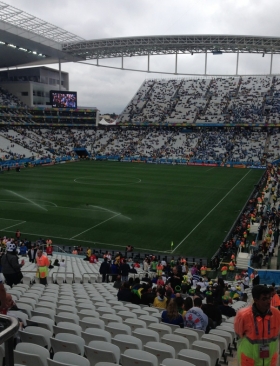World Cup - the remaining venues
World Cup - the remaining venues

The World Cup semi-finals are finally upon us. Brazil has been a wonderful host - with four games left we look at each location ahead of the remaining games.
Brazil, the hosts, will take on the strongly fancied Germany. The Netherlands will take on Argentina. That's an excellent looking schedule with some interesting outcomes for the final as well. Bitter rivalries? Revenge for previous tournament defeats? You name it; the World Cup final this time is going to have it.
Speaking of Brazil, what a brilliant host the country has been. Talk prior to the tournament had been about civil unrest, rioting and unfinished stadiums. Any visitor to Brazil will tell you that this is exactly the opposite to what they have seen. Brazil 2014 has been a success.
The Stadiums and Facilities in Brazil
The facilities for the event have been outstanding. Granted, for a country that loves the beautiful game just as much as the Brazilians do, you would expect excellent stadia. However it goes beyond that, the local people have been welcoming and within the stadiums we have seen very little trouble. That is a testament to the hard work of the authorities in every City that had hosted a game.
So, what do we know about each individual location for the last four games of the tournament? Let's start with the location for Brazil against Germany...
Belo Horizonte
Tucked away in the heart of Minas Girais, stands one of the country's finest stadiums. The Mineirao. Opened in 1965 and revamped in 2012, this state of the art stadium sits in the far north of Belo and hosts Brazilian favourites Cruzeiro. With this city being famous for having more bars per person than any other place in Brazil, things can get rather rowdy in the Mineirao.

The stadium hosted England's game against Costa Rica and for those who were there, many compared the Mineirao to the Maracana but a minature version of the Rio stadium.
From the outside, the Mineirao does look a little dated. But once inside that's forgotten when you see the facilities and experience the atmosphere.
The omens are already with the home country in Belo Horizonte. The penalty victory over Chile - who were arguably the better team on the day - sparked wild scenes of jubilation across the country. Those in Minas Gerais claimed that the spirit of the fans in the Mineirao that day pushed Brazil over the finishing line to win the shoot out.
With 72000 seats in the arena, expect the locals to be snapping up tickets at extortionate rates.
São Paulo
The other semi-final takes place in the country's major financial district, São Paulo. The stadium, known as the Arena Corinthians, named after the local favourite team; had been struggling for completion prior to the tournament. Notable incidents in this stadium effectively put the stadium at risk of a cancellation.
Travelling to and from the stadium is easy enough, with a train station especially built - Itaquera - just for the arena.

From most points in SP a subway can be found and will connect to the main line that reaches the stadium directly. There is a long walk from the train station to the venue, but that is most enjoyable as you whisk past the Brahma beer salesmen and join in both local supporters' chants as well as the contributions of the visiting fans.
Once at the stadium, it's not difficult to understand and see why this venue very nearly didn't host any games at the World Cup. Two stands appear to be unfinished and without a roof, whilst on the outside the area is covered with plastic material. Inside each contains what can only be described as scaffolding, no wonder there were concerns over the safety of this arena.
Once inside, the atmosphere can only be described as bullish. The Corinthians Arena hosted the crucial game between Uruguay and England, with both country's fans in full voice and expectant of victory. The stadium is wonderfully open plan so that noise does travel between the stands and loudly too.
With Argentina being so close to Brazil, you can only imagine that tickets will be snapped up very quickly. This semi-final is going to be a jaw dropping event.
Brasilia
What most people forget is that Brasilia is the capital of Brazil and also that the City is entirely man made within the last 60 years. This beautiful city had been strategically located in the centre of the country so that politicians would be able to easily travel between neighbouring states. A City full of famous and stunning architecture, it is fair to say that Brasilia would be worth a visit for the scenery and not just the football!

The stadium itself had been named after one of Brazil's best ever players, Garrincha. The site of the third and fourth place play-off, Brasilia is ready.

Located at the northern point of Eixo (known as axis in English) the architects designed the stadium with space in mind. With no surrounding buildings for over a kilometre, the view as you walk up to the Estadio Nacional Mane Garrincha is simply breathtaking. Brasilia's venue is known as the national stadium and there is a good reason why this is; locals deserve to feel proud of this wonderfully designed arena.
With columns stretching up supporting the roof of the stand, you would be forgiven for thinking you had stepped back into Roman times and visited the Colosseum. Zig-zag walkways wrap themselves around the stadium as supporters flood in.
Then inside: breathtaking. Two huge tiers hold up to 80,000 football mad fans and the noise is deafening. During Portugal's win over Ghana, both local and traveling support made this showpiece event one to remember.
Whilst many would say that the final game to be played at the National Stadium is worthless, history has dictated that once the game begins neither team takes the event lightly. It is historically very competitive.
Rio de Janeiro
The final awaits. The Maracana is ready. After one month of almost daily action, the greatest show on earth comes to a close.
If you ask any football fan to name three of the most famous stadiums in the world, you'll be sure that most will point to the Maracana as part of their trio.

There are many reasons for that, talk about games hosting 200,000 fans (Uruguay - Brazil, 1950); major cup finals and memorable goals, the Maracana is the home of Brazilian football.

Opened in the 50's and renovated multiple times over the years, the Maracana is iconic in appearance and in its history.
Four of Brazil's most famous teams play here - Fluminese, Botafogo, Vasco De Gama and Flamengo - during games at the World Cup you can often hear fans of each team chanting at each other. When this World Cup finally decided its winner, Rio will have hosted seven fantastic games.
Rio's Maracana can be reached easily by subway (by the way, the nicest touch being that the trains are free after every game) from practically any part of RJ.
On approach to the arena, the beautifully constructed circular can be seen from miles away.
Inside, the most electrifying atmosphere. Watching a Mexican wave run it's way through the stadium feels like it takes forever - that's just how big the Maracana is.
On to the semi-finals we go!


